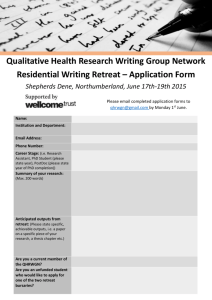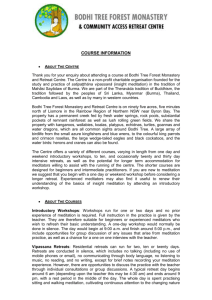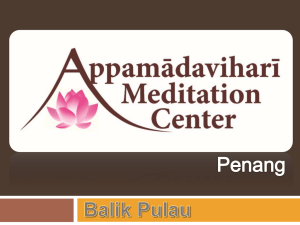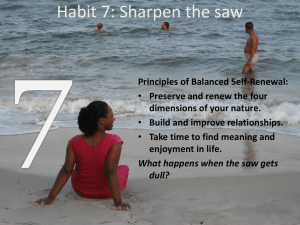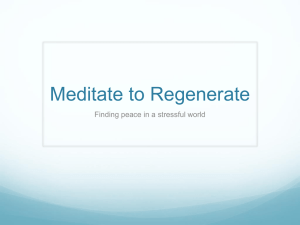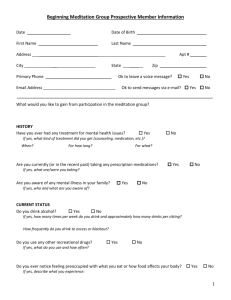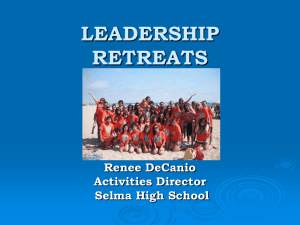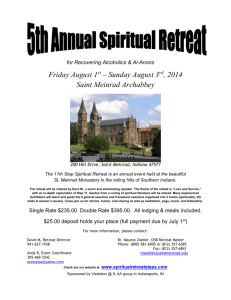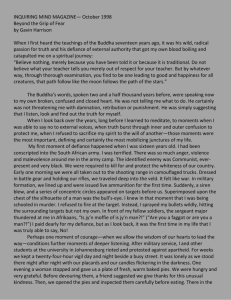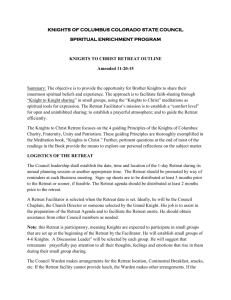Odyssey magazine – March 2009
advertisement
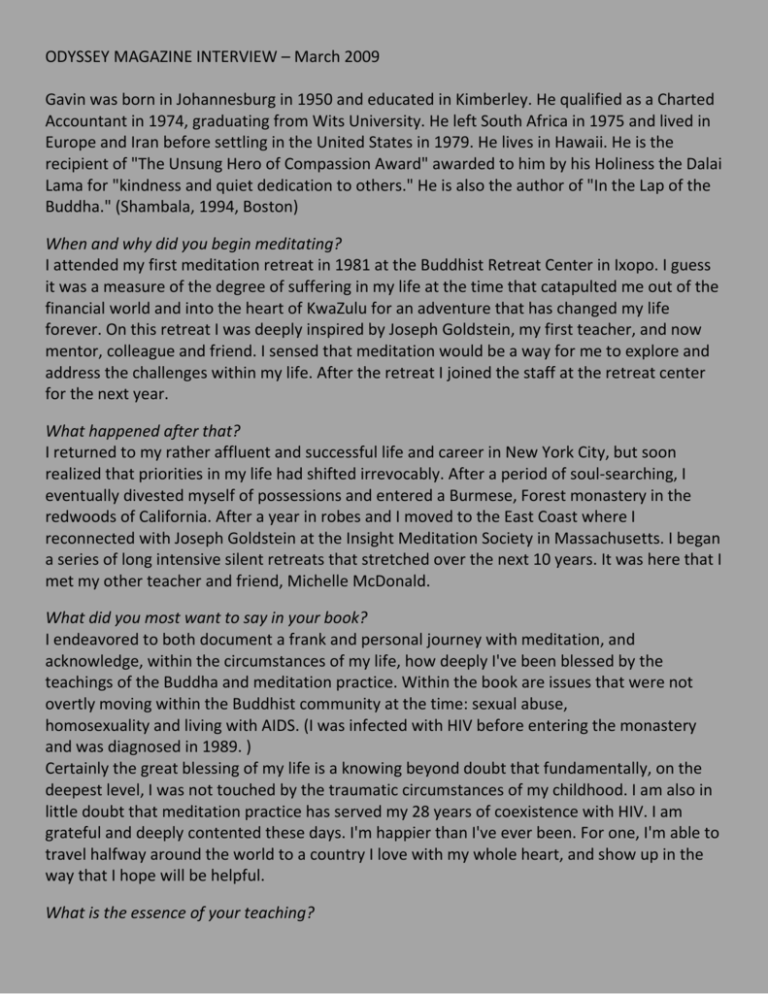
ODYSSEY MAGAZINE INTERVIEW – March 2009 Gavin was born in Johannesburg in 1950 and educated in Kimberley. He qualified as a Charted Accountant in 1974, graduating from Wits University. He left South Africa in 1975 and lived in Europe and Iran before settling in the United States in 1979. He lives in Hawaii. He is the recipient of "The Unsung Hero of Compassion Award" awarded to him by his Holiness the Dalai Lama for "kindness and quiet dedication to others." He is also the author of "In the Lap of the Buddha." (Shambala, 1994, Boston) When and why did you begin meditating? I attended my first meditation retreat in 1981 at the Buddhist Retreat Center in Ixopo. I guess it was a measure of the degree of suffering in my life at the time that catapulted me out of the financial world and into the heart of KwaZulu for an adventure that has changed my life forever. On this retreat I was deeply inspired by Joseph Goldstein, my first teacher, and now mentor, colleague and friend. I sensed that meditation would be a way for me to explore and address the challenges within my life. After the retreat I joined the staff at the retreat center for the next year. What happened after that? I returned to my rather affluent and successful life and career in New York City, but soon realized that priorities in my life had shifted irrevocably. After a period of soul-searching, I eventually divested myself of possessions and entered a Burmese, Forest monastery in the redwoods of California. After a year in robes and I moved to the East Coast where I reconnected with Joseph Goldstein at the Insight Meditation Society in Massachusetts. I began a series of long intensive silent retreats that stretched over the next 10 years. It was here that I met my other teacher and friend, Michelle McDonald. What did you most want to say in your book? I endeavored to both document a frank and personal journey with meditation, and acknowledge, within the circumstances of my life, how deeply I've been blessed by the teachings of the Buddha and meditation practice. Within the book are issues that were not overtly moving within the Buddhist community at the time: sexual abuse, homosexuality and living with AIDS. (I was infected with HIV before entering the monastery and was diagnosed in 1989. ) Certainly the great blessing of my life is a knowing beyond doubt that fundamentally, on the deepest level, I was not touched by the traumatic circumstances of my childhood. I am also in little doubt that meditation practice has served my 28 years of coexistence with HIV. I am grateful and deeply contented these days. I'm happier than I've ever been. For one, I'm able to travel halfway around the world to a country I love with my whole heart, and show up in the way that I hope will be helpful. What is the essence of your teaching? The teachings are singularly concerned with a movement from the illusion of separation to the truth of wholeness and oneness. The flowering of love, healing, happiness and peace are byproducts of this fundamental shift from the manifest to the unmanifest nature of our being. So the entire retreat context- the meditation practices, the silence, the inquiry, the talks- are all in service to a fundamental awakening to the deepest truth of who we are- that which is always and already present. Are the retreats open to people who have never meditated before? Absolutely! In fact coming to the retreat experience without an accumulation of spiritual information and practices is a beautiful thing. Fundamental to the flowering of our being is a quality of innocence, nakedness and childlike curiosity, what has been called "a beginner's mind." Being new to meditation practice can be an advantage. Retreats are open to all who are sincerely concerned with being true, human, real and authentic. It is not unusual for people from different spiritual traditions to participate together on silent retreat. At the core of the mystical experience, whatever the tradition, is the revelation of the timeless, uncreated stillness and silence that is the ground of being for all of us. Retreat is a context within which this fundamental revelation can happen. What is the relevance of meditation and the retreat experience in the everyday world? I consider the simple meditation practices offered on retreat to be nothing more than a context in which the heart/mind is allowed to come to ever deeper rest and ease. As we relax inwardly, there flowers a capacity to allow everything to be as it is. When life is lived without argument or resistance, it is possible to perceive with clarity and understanding: We open to the possibility of responding to life appropriately, lovingly and powerfully, without confusion, reaction and negativity. The qualities that ripen on the meditation cushion hopefully begin to flow into every corridor of this precious human life. Otherwise spiritual practice is nothing more than a narcissistic and limited endeavor. The triumph of spiritual practice is in its embodiment. We live our spiritual understanding. This is growing up spiritually, our "spiritual adulthood" if you will. Rumi, the extraordinary Sufi poet of the 13th century termed this "becoming a true human being.” Perhaps our suffering world cannot afford a myopic, self-involved spirituality, limited to the four walls of our churches, mosques, temples, monasteries, ashrams or retreat centers anymore! You mentioned Rumi, are your retreats Buddhist? I "grew up" in the Buddhist, Insight Meditation (also known as Vipassana) community. For this I am deeply grateful. The Buddha was masterful in his understanding of the human mind and the practices that liberate the mind from suffering. Increasingly over the years I've been drawn also to the teachings and practices of truth at the heart of all mystical traditions, particularly the Gnostic Gospels of Christ, the mystical teachings of Islam and the poets who have written from the awakened state. I no longer consider myself singularly Buddhist. I have abiding reverence and respect for the Buddha, Christ, the Sufi poets Hafiz, Rumi, Kabir, Rabia and the Christian mystics from St. Teresa, St. Francis, Julian of Norwich to Thomas Merton. T.S. Eliot, Rilke, Ramana Maharshi, Sri Aurobindo and Nisargadatta have enormously impacted my life also. Any reflections upon our world today? Although it is 34 years since I stopped living permanently in South Africa, I'm constantly reminded of my roots within this beloved continent. On the night that Barak Obama was elected president, I wept uncontrollably for hours as the results came in. While I certainly was relieved and grateful for the profundity of this moment for America and the world, the tears were mostly those of a "child of Africa". It felt triumphant, evocative of the moment Mandela walked out of the gates of Polsmoor prison or the collapsing of the Berlin wall. It's amazing! At this most dire global juncture, there is also a concurrent feeling of hope, excitement and anticipation in the air. It is critical that those of us whose hearts have turned to truth in a deep and authentic way, live and embody this stirring in an overt and unrestrained way: coming out of the closet about who we really are, and what we value. I of course have no idea how the future will unfold. I am unambiguously clear what I am for, rather than against. And what I am for as I mentioned earlier is this fundamental and unfolding shift from the illusion of separation, apartheid, racism and division to the truth of wholeness, oneness. Martin Luther King termed this "keeping an eye on the prize!" When life is lived from the truth of our being we become an instrument of peace, love and reconciliation in our divided world. Perhaps this is our fundamental responsibility as human beings to have the courage to live our understanding. We are all held in a vast web of interconnection, from which we cannot fall, we only think we can when we forget, and I am in no doubt that we each have a significant part to play within this interconnectedness . Tell us a little about living and teaching in Hawaii? I live on the Big Island of Hawaii. We are the youngest island and currently have one very active volcano pouring lava into the ocean. We are the only landmass in the world growing bigger every day. To stand and witness the collision of what the Buddha called "the four great elements", fire, earth, water and air in collision, is a most stirring and magnificent spectacle. I often hike out to the lava flow and am always spellbound by the boiling blood red ocean, waterfalls of molten rock, colossal plumes of glass and chemicals flying into the atmosphere and the heat, thunder and glory of it all. We have every climate zone except arctic tundra on this amazing Island. In the winter, while snow caps the tops of some volcanoes, we get to surf and boogie board on the beaches below. I've been teaching on the island for 10 years and we now have an active and committed meditation community. We meet weekly and monthly in meditation groups around the island. There also are regular meditation retreats throughout the year. I'm deeply grateful to be able to serve in a way that has deep and fulfilling personal meaning, in a place I adore. I love what I do. It is a great privilege, blessing and a lot of fun! If you travel from Hawaii right through the center of the earth you come out on the slopes of Table Mountain! So my commitment is literally from one side of the planet to the other: from the Beloved Island to the Beloved Country! I swim in the nearby ocean almost every day, adventuring way out into the deep blue sea. It is not unusual to be in the company of turtles, manta rays, dolphins, certainly a lot of fish and sometimes a shark or two. In winter the water is filled with the singing of the humpback whales, visiting from Alaska to birth their offspring. I'm also a student of yoga and tai chi. How was your time in South Africa last year, and what are your hopes for this visit? I returned home in March and April 2008, after a 14-year absence. I made four significant personal pilgrimages during my visit. Firstly a wrenching journey back into history at the Apartheid Museum in Johannesburg. While I thought I was significantly abreast of the tragedy of apartheid and it’s unfolding, I was certainly disabused of that notion. There was so much I didn't know. What I learnt was sobering, humbling and heartbreaking. So too was my a day on Robben Island. The Freedom Park outside Pretoria is amazing! Along with its sobering acknowledgment of our violent history spanning four centuries , it is also such a beautiful, inspiring and even exhilarating place . And my last pilgrimage was coming face-to-face with the reality of AIDS in Africa . This affected me more deeply than I could ever put into words. I am well aware of the significant privileges I have enjoyed in my own journey with HIV, opportunities significantly unavailable to my fellow countrymen. Meeting the orphans and vulnerable children in Ufafa Valley, KwaZulu changed my life forever. Since returning to Hawaii in April I've been significantly involved in a fundraising endeavor to support the Woza Moya project, a stirring community response to AIDS in the Valley. How meditation community in Hawaii has significantly funded the building of a Children's Play Therapy Center and A Volunteer and Doctors Lodging structure . Construction is scheduled to begin January 12, 2009. We have also sponsored the schooling for over 50 children. There's a lot of information and music on our website: wozamoyahawaii.org It was a profound privilege on this visit to be invited to teach meditation retreats at two of the most beautiful retreat centers in the world, the Buddhist Retreat Center in KwaZulu (http://www.brcixopo.co.za/) and Bodhi Khaya Retreat, in the Western Cape (http://www.bodhi-khaya.co.za/). These centers are absolutely perfect for contemplative practice and wonderful places to step out of the busyness of the world and turn to the deeper currents of our lives. I will be teaching three retreats at each center during February, March and April. I cannot wait, to reconnect once again with friends in my beloved homeland!

